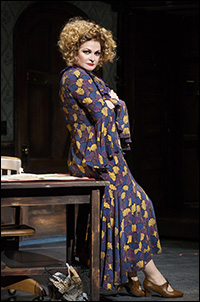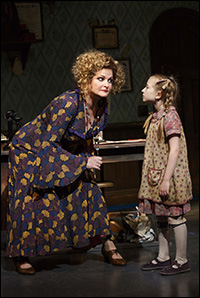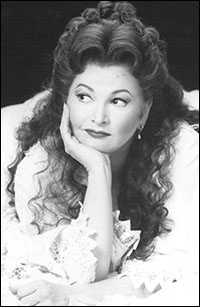
Faith Prince
It seemed only a matter of time before Faith Prince, one of the most gifted comedic actresses in the American musical theatre, would take on the role of Miss Hannigan, the lovably evil orphanage matron created to Tony-winning effect by the late, delicious Broadway clown Dorothy Loudon in the original 1977 production of the classic, family-friendly musical Annie. Prince is the third actor to take on the role in the current, Tony-nominated revival, all with impressive resumes; in fact, she follows two-time Tony winner Katie Finneran and, more recently, Emmy winner Jane Lynch. Prince, whose more dramatic work in the musicals A Man of No Importance (by Lynn Ahrens, Stephen Flaherty and Terrence McNally) and A Catered Affair (by Harvey Fierstein and John Bucchino) moved this writer tremendously, is also one of the most gifted vocalists to take on the role, which allows her to strut her stuff in such Charles Strouse-Martin Charnin gems as "Little Girls" and "Easy Street." I recently had the pleasure of catching up with this multitalented star of stage and screen, who spoke about her return to Broadway in the James Lapine-directed musical as well as her work as devoted dance teacher Mrs. Wilkinson in the national tour of Billy Elliot; that conversation follows.
Question: How did this role come about?
Faith Prince: Honestly, I just got a phone call from my agent that said James [Lapine] wants you to go into the role of Hannigan after Jane Lynch. And I went, "Wow, okay!" [Laughs.] It was a bit of a scramble because it was so fast.
Question: What went into your decision to take the role?
Prince: My son actually is headed to college now. But I don’t know, it sounded like it’d be a great role for me—kind of delicious, all of the right elements… And, it’s a show that’s already up and running… Sometimes it takes so long to get something workshopped, which is a great process, but you know going towards that is a lot more involved. This was there, done, up and running, and it just was a matter of changing a lot of my things for summer because I’d had my summer pretty well planned out with concerts and teaching. There was a thing in St. Louis for ten days, I had a week in Philly for teaching. I just had to kind of rearrange all that, and people were great about it because it’s what we do, you know? [Laughs.]
Question: Have you ever done this part before?
Prince: I had never, no.
Question: What are the challenges of joining a show that is already up and running?
Prince: Well, I’ll tell you, it’s funny, when you teach as well and have a studio, you’re kind of looking at things from a performer's viewpoint but also how to explain it to somebody else and break it down. Like, "What can I extract from this?... Ooh, this is really interesting information." This is the fourth time I’ve replaced. The first time was in King and I for Donna Murphy, and the next time was [James Joyce's The] Dead, for Blair Brown with Christopher Walken. I played his wife in The Dead, it was Richard Nelson’s piece, and then [The Little] Mermaid and now this. And I’ll tell you, comedy is the absolute hardest to replace in because your sense of humor, your sense of comedy, even though it’s written out for you, it’s so personal. And, I would say that’s the trickiest because you’re going behind somebody else’s blueprint. And it’s really interesting, but I had remembered with Mermaid, because Sherie Rene Scott and I couldn’t be more different, but you just have to get in there and find the blueprint and give people what they need. Then you start to find your own way within it. You can’t panic; it’s really a process… And when you have a good director, like James, he wanted me to bring myself to it, but I still had to honor what was. So it’s just very interesting, but it’s doable—you just have to kind of get in there. And the other actors, once you’re playing with them and everyone is present, I think it’s a lot of fun!
 |
||
| Prince in Annie. |
||
| Photo by Joan Marcus |
Prince: Well, I find her very complex actually, which is, to me, always the sign of a delicious role. And I’ll tell you, the work that Katie Finneran did — she and I had actually worked together in Noises Off — what I love about [this] Miss Hannigan that, to me, is the most different from when I saw it—I believe on Broadway with Dorothy Loudon—[is she's] not a battle ax. There is a sexiness about her that they kind of put in both to the costumes and it’s just in the blueprint. What that does is it kind of makes you understand where she’s coming from and why she’s so frustrated… It’s like when you’ve been frustrated and you’re a human being, and it’s the end of the day and that kid just pushes you one step too far. Suddenly, you’re going from being nice to the neighbor and after the neighbor leaves, you go, "Let me tell you something, if you do that again…" [Laughs.] It’s finding the levels like that because every time there’s a man around she’s flirting, and she listens to her stories on the radio and she kind of becomes those women. Her voice kind of changes. It’s like, “Oh, officer, thank you so much,” but then…[with the orphans] it's like, “Let me tell you something, the last time you go through that door it’ll be 1953!” It just has such beautiful levels that lend itself to the comedy.
Question: How did you go about approaching “Little Girls”? When Dorothy Loudon first performed the song, no one had heard those lyrics. When you’re doing a song that a lot of people know already, how do you go about getting laughs?
Prince: Probably that’s why he added the girls [to the scene], and they turned it into a number with the children. I added a little scarf so I could sort of choke myself. I just wanted to make sure that it was a desperate attempt: "You know what, these kids are pushing me over the frickin’ edge!" And, somehow, that little scarf, just choking myself and putting it into pigtails just kind of pushed it that step further. I just wanted to make sure people knew she's on the brink, like, "I have frickin' had it!" And, it’s one of the steps, because she’s competing with an 11-year-old and the 11-year-old is winning! The 11-year-old is getting everything she wants. And it’s a series of building, which is why she finally agrees to go on this scam with her brother, who always has a scam, but she thinks actually this time it may happen. But it’s just making sure that the groundwork is laid. Peter Lawrence, the stage manager, who's actually on another show now, came back and saw it, and he said, “You know what, you’re mean!” And I said, “Well you have to be. It’s like Ursula.” … He said, “It’s great for the adults.” And I said, "You know who it’s even more important for?" The children, because they know when you’re playing at something. It’s like my dad used to be. I was scared of him until he really took out the belt, because he never did anything with it. But beforehand he used to get really angry. She’s kind of like that. She has a big bark, but she never really is abusive to the point of being really scary. When she turns, it’s like she’s kind of bipolar. You never know what you’re going to get.
 |
||
| Prince and Emily Rosenfeld |
||
| photo by Joan Marcus |
Prince: Absolutely, and I think that's what makes the kids kind of crazy. Because if somebody’s just mean all the time, you know what you’re going to get. When they turn and play games on you, "Oh, children, there’s something in the kitchen," and it just never comes to fruition, but she’s sort of nice. She lets them watch the stories with her. To me, that’s what's unsettling because it’s inconsistent, and that’s the worst thing for a kid. She’s a kid herself because she’s never gotten what she needed.
Question: Do you have a favorite moment for her?
Prince: I hope it stays in, but I put back the scream…when she’s had it with Grace… [Miss Hannigan] says, "Now let me get this straight, Annie’s going to be the daughter of a millionaire," and [Grace] says, “No, no, not the daughter of a millionaire, the daughter of a billionaire… I just came by to say that Warbucks says she’s never coming back ever."… I turn around and pull up my dress and [scream]! Then I turn back around very calmly, nothing on my face, and say, "Got any more wonderful news?" [Laughs.] And it’s pretty funny, and the kids like it, too. But I’ve tried it every which way. I tried going out of the door, shutting the door, too long. I tried opening the door, screaming out. James said to stay in the room. She still needs a little cover. I just pull up my dress. But it needs to be physically heightened as well as rooted in reality. And, to me, it’s like Guys and Dolls. It’s the hardest to do and really be true to both, but that’s why I love doing it eight times a week, trying to master that.
 |
||
| Prince in The King and I. |
||
| Photo by Joan Marcus |
Prince: Absolutely! James said to me, "You know what's funny, you get laughs I’ve never heard. And other things that are sort of normal laughs, you don’t get." And I said, “Well, the goal is to get them all!” [Laughs.]
Question: You’ve now done three shows with a lot of children, The King and I, Annie, Billy Elliot. What is it like working with a lot of child performers?
Prince: Honestly, I think they’re incredible. I think they’re the most present. Billy Elliot was a huge machine with so many assistants and directors. And they would always ask if I had any notes for the kids, and I’d say, "No, that’s not my job." I’m very respectful of that. I mean if there is an issue that keeps coming up, I might go to the assistant and say, "You might want to look at this." But, honestly, maybe once in all of those shows, I said, "Take a look at this. I'm not sure what's going on. I don’t know if it’s me or them." But comedy is the hardest because sometimes the setups aren't right. I mean for myself, too. It's like, "Look at this. I'm not sure what I'm doing or why I'm not getting this." I’m just always open to making it better and finding it, for myself, too. I always have gotten along with kids. I was always the best babysitter in the neighborhood because I used to play show tunes; I didn’t watch TV. I was an RA in college, a camp counselor, and I have a son myself. I’ve always loved kids, and I really treat them like adults. And, I mean that by being respectful. I never talk down to them. I really enjoy it.
Question Were you performing at that age?
Prince: I did a talent show in first grade, but fifth grade I think was my first community center show. I just remember the adults in that were always so good to me, and it meant a lot when they’d talk to me and spend time with me.
Question: You mentioned Billy Elliot earlier. What was your experience like touring with that musical?
Prince: Oh my God, she’s an incredible role. And quite complex. Really dark. That whole show. Her daughter wasn’t talented—here she is going to help this kid, and she can’t even talk to her own daughter. That role you could really, really chew on for a long time. And I enjoyed really being that woman, and I remember Julian Webber, who is sort of in charge of all the companies under Stephen Daldry, is just a fantastic director, too. And once he walked in the room, I thought, "Okay he’s going to really show me who this woman is." And he was just phenomenal; he’s a genius. I mean James is a genius in a completely different way. I just love good directors—I like to be directed. I like to bring a lot to the table, and I come prepared with lots of thoughts, but I really enjoy the collaboration… It was a really good part for me. The cigarette and the toughness, but the only reason she’s tough is because she’s been beaten down. And in that community she was one of the only women that stood up to the men there. She had huge dreams of going somewhere and being something else, and here she is stuck in this town… She has this kid she doesn’t really get along with. To me that was tragic, too. I remember the little girl who played Debbie. I’d say to her every night, “You know, I’m crazy about you, right?” It was hard to get pounded on like that eight times a week. Your body doesn’t know you're acting. So I used to say that to her before or after or during—"You know how crazy I am about you"—because I was just really pounding on her the whole entire show.
Question: How long are you staying with Annie?
Prince: At least until January. I’m really enjoying it. The company is amazing, and can I tell you that Anthony Warlow is just a beaut. We only have one exchange [on stage], but we’re always in each other’s dressing rooms telling stories. I think we may do something together… We've got good chemistry… He’s just so talented… We just come from the same sort of school. We’re kind of wracking our brains because there’s a lot of ways we could go. We could do comedy, we could do an old married couple, we could do Sweeney Todd… Read about Faith Prince's Favorite Things here.
Watch a video celebration of Prince here.
[For more information visit AnnieTheMusical.com.]
Well, that's all for now. Happy diva-watching! E-mail questions or comments to [email protected].
PHOTO ARCHIVE: Celebrating Tony Award Winner Faith Prince




















































